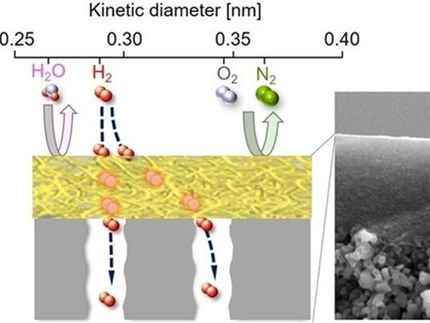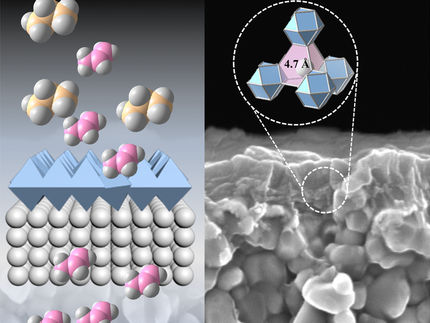Greening hydrocarbon separation and crude oil refining
Polymer-based membranes that selectively separate hydrocarbon and crude oil mixtures could eclipse current industrial thermal processes
Polymer-based membranes developed at KAUST could enable greener and cheaper industrial separation approaches. Their stability and selectivity can be tuned by thermal crosslinking to separate simple hydrocarbon mixtures and complex Crude Oil fractions.
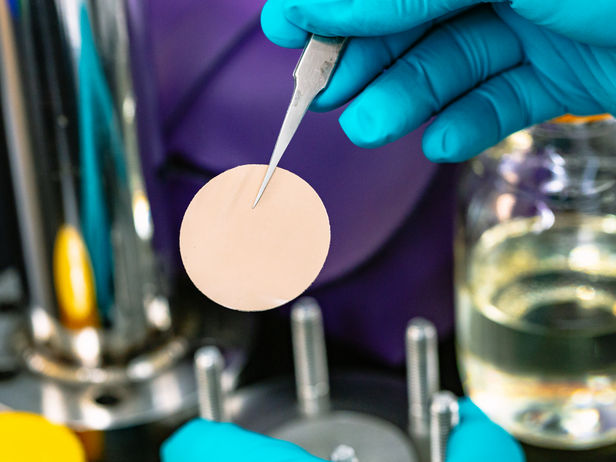
An organic polymer membrane developed my KAUST scientists offers a greener and more sustainable way to separate hydrocarbon mixtures.
2022 KAUST; Anastasia Serin.
Separation processes, such as distillation and evaporation, are central to the chemical, pharmaceutical and petrochemical industries, but they are also energy intensive, expensive and polluting. Each year, crude oil refineries consume about one percent of the total energy used worldwide, and some refineries can even release up to 20 to 35 million tonnes of carbon dioxide (CO2) into the atmosphere.
“Decreasing greenhouse gas emissions is a step forward in addressing climate change,” says lead author Stefan Chisca, a research scientist at KAUST. Membranes, with their low carbon footprint and ability to fit in small spaces, offer an attractive alternative to these heat-based processes and can reduce the CO2 emissions of crude oil refineries.
Polymer membranes are cheaper and easier to manufacture and adapt to large-scale processes than inorganic membranes. Yet, their low stability under harsh industrial conditions, such as elevated temperature and certain solvents, affects their performance.
The researchers chose the polymer polytriazole — bearing hydroxyl functional groups as a stable backbone — for their membrane. They deposited the polymer dissolved in various solvents onto a glass plate and immersed the support in distilled water to remove the resulting film. Next, they heated the film in a furnace to crosslink the hydroxyl groups and generate a membrane stable in organic solvents as well as in highly acidic and basic media.
Crosslinking is necessary for challenging applications and must provide stability in the broadest range of conditions, explains team leader Suzana Nunes. “The key to obtaining membranes that could resist harsh environments like crude oil is the presence of the hydroxyl groups,” she says.
The membranes enriched hydrocarbon mixtures by up to 95 percent in compounds containing less than ten carbons. They showed higher selectivity toward paraffins over aromatics, allowing the researchers to target different crude oil mixtures.
“Another crucial factor for the success of these membranes is their asymmetric porous morphology,” Nunes says. The top surface of the membranes presented an ultrathin dense layer consolidated by crosslinking, providing size selectivity. The underlying layers showed a highly porous structure with open interconnected pores that gradually increased with increasing depth to enable permeation.
Chisca explains that the team is now scaling up the membranes and manufacturing test modules for pilot plants. Incorporating a polytriazole membrane unit into existing refineries can improve these processes by producing higher purity components or removing byproducts while reducing energy consumption.
Topics
Organizations
Other news from the department science
These products might interest you
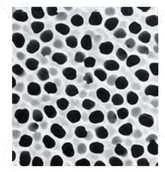
Anopore™ by Cytiva
Precise filtration made easy with Anopore inorganic membranes
The aluminum oxide filter membrane that can increase the purity or yield of your analyte
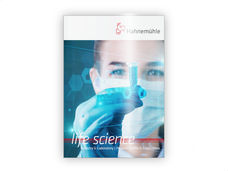
Hahnemühle LifeScience Catalogue Industry & Laboratory by Hahnemühle
Wide variety of Filter Papers for all Laboratory and Industrial Applications
Filtration Solutions in the Life Sciences, Chemical and Pharmaceutical Sectors

Get the chemical industry in your inbox
By submitting this form you agree that LUMITOS AG will send you the newsletter(s) selected above by email. Your data will not be passed on to third parties. Your data will be stored and processed in accordance with our data protection regulations. LUMITOS may contact you by email for the purpose of advertising or market and opinion surveys. You can revoke your consent at any time without giving reasons to LUMITOS AG, Ernst-Augustin-Str. 2, 12489 Berlin, Germany or by e-mail at revoke@lumitos.com with effect for the future. In addition, each email contains a link to unsubscribe from the corresponding newsletter.
